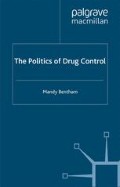Abstract
The 1980s saw the wider availability and growing consumption of illicit drugs. It also saw the emergence of an international consensus against drug trafficking by the international community. The increase in drug trafficking has occurred despite increasing international action through the main international control body, the United Nations, and other international institutions, to prevent it. This work has shown that there are many difficulties involved in attempts by legal structures to control an illegal activity, especially one which is as multi-faceted and multi-dimensional as the drug phenomenon. Suppression of one source of supply, one method of transportation and one pattern of abuse has often simply led to the emergence of other forms. This work has attempted to set the ‘drug problem’, as it has become known, into a theoretical framework which aids our understanding of the phenomenon, by further developing theories of regime creation. Because the drug phenomenon is complex and multi-faceted, it requires precisely the issue-specific approach of international regimes as understood by this research.
Access this chapter
Tax calculation will be finalised at checkout
Purchases are for personal use only
Preview
Unable to display preview. Download preview PDF.
Notes
O. Young, ‘The politics of international regime formation: Managing natural resources and the environment’, International Organization, Vol. 43, No. 3, Summer 1989, pp. 349–75.
P. M. Haas, ‘Do regimes matter? Epistemic communities and Mediterranean pollution’, International Organization, Vol. 43, No. 3, Summer 1989, pp. 377–403.
P. M. Haas, ‘Banning chlorofluorocarbons: Epistemic community efforts to protect stratospheric ozone’, International Organization, Vol. 46, No. 1, Winter 1992, pp. 187–225.
See A. Fikkan, G. Osherenko and A. Arikainen, ‘Polar bears: The importance of simplicity’, in O. Young and G. Osherenko (eds), Polar Politics. Creating International Environmental Regimes (Cornell University Press, Ithaca and London, 1993), pp. 96–152.
R. Tooze, ‘Regimes and international co-operation’, pp. 210–15 in A. J. R. Groom and P. Taylor (eds), Frameworks for International Cooperation (Pinter Publishers, London, 1990), quote at p. 211.
See R. W. Cox, ‘The crisis of world order and the problem of international organization in the 1980s’, International Journal, Vol. XXXV, No. 2, Spring 1980, p. 377.
S. D. Krasner (ed.), International Regimes (Cornell University Press, Ithaca and London, 1983), Chapter 5, ‘Regimes and the limits of Realism: Regimes as autonomous variables’, p. 358.
See C. Jonsson, International Aviation and the Politics of Regime Change (Frances Pinter, London, 1987), Introduction.
R. W. Mansbach and J. A. Vasquez, In Search of Theory. A New Paradigm for Global Politics (Columbia University Press, New York, 1981), p. 62.
D. Easton, A Systems Analysis of Political Life (The University of Chicago Press, Chicago and London, 1979, first pub. 1965), p. 45.
J. Donnelly, ‘The United Nations and the global drug control regime’, pp. 282–304, quote at pp. 282–3, in P. H. Smith (ed.), Drug Policy in the Americas (Westview Press, Oxford, 1992).
J. Donnelly, ‘International human rights: A regime analysis’, International Organization, Vol. 40, No. 3, Summer 1986, pp. 599–642. Types of international regimes at pp. 603–4.
K. D. Wolf and M. Zurn, ‘“International Regimes” und Theorien der Internationalen Politik’, Politische Vierteljahresschrift, Vol. 27, pp. 210–21, as quoted in V. Rittberger (ed.), Regime Theory and International Relations (Clarendon Press, Oxford, 1993), p. 9.
See Declaration 32 of the Final Act of the Maastricht Treaty in The Unseen Treaty. Treaty on European Union. Maastricht 1992 (David Pollard Publishing, Oxford, 1992), p. 63.
R. Birch, ‘Why Europe Needs Interpol’, Police Review, 17.1.92, as quoted in B. Hebenton and T. Thomas, ‘Rocky path to Europol. Europe’s police see information-sharing as the key to controlling the traffickers, but who controls the controllers?’ Druglink, Vol. 7, issue 6, November-December 1992, p. 9.
M. Friedman and T. Szasz, On Liberty and Drugs: Essays on the Free Market and Prohibition, ed. by A. S. Trebach and K. B. Zeese (The Drug Policy Foundation Press, Washington, DC, 1992).
E. Brecher, Licit and Illicit Drugs, Greenwood Press, Boston, 1972).
See E. A. Nadelmann, ‘The case for legalisation’ in J. A. Inciardi (ed.), The Drug Legalization Debate (Studies in Crime, Law and Justice, Vol. 7, Sage Publications, London, 2nd edn 1991), p. 19.
Coordinamento Radicale Antiproibizionista, The Cost of Prohibition On Drugs. Papers of the International Anti-Prohibitionism Forum (CORA, Italy, 1989) and
A. S. Trebach and K. Zeese (eds), Drug Policy 1989–1990. A Reformer’s Catalogue (Drug Policy Foundation, Washington, DC, 1989).
Copyright information
© 1998 Mandy Bentham
About this chapter
Cite this chapter
Bentham, M. (1998). International Regimes and Drug Control in the 1990s. In: The Politics of Drug Control. Palgrave Macmillan, London. https://doi.org/10.1057/9780230376595_7
Download citation
DOI: https://doi.org/10.1057/9780230376595_7
Publisher Name: Palgrave Macmillan, London
Print ISBN: 978-1-349-40568-8
Online ISBN: 978-0-230-37659-5
eBook Packages: Palgrave Political & Intern. Studies CollectionPolitical Science and International Studies (R0)

